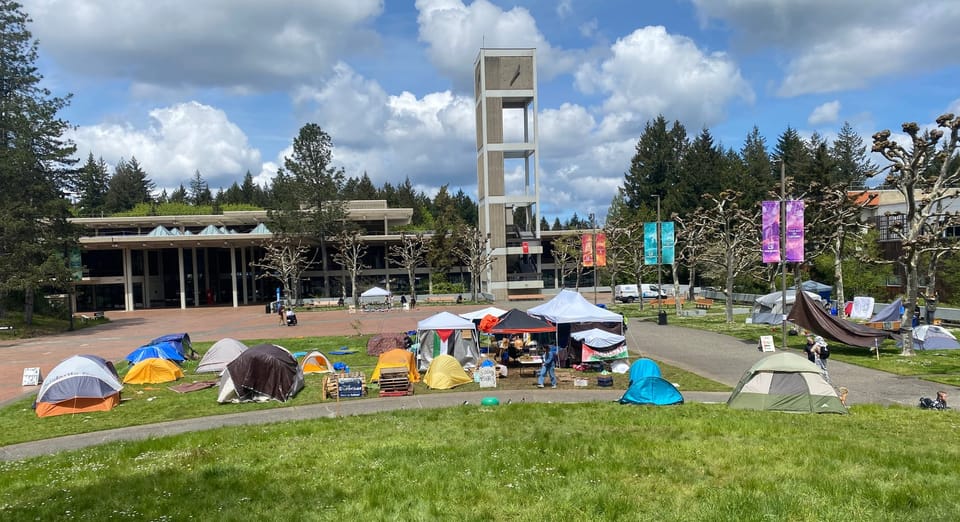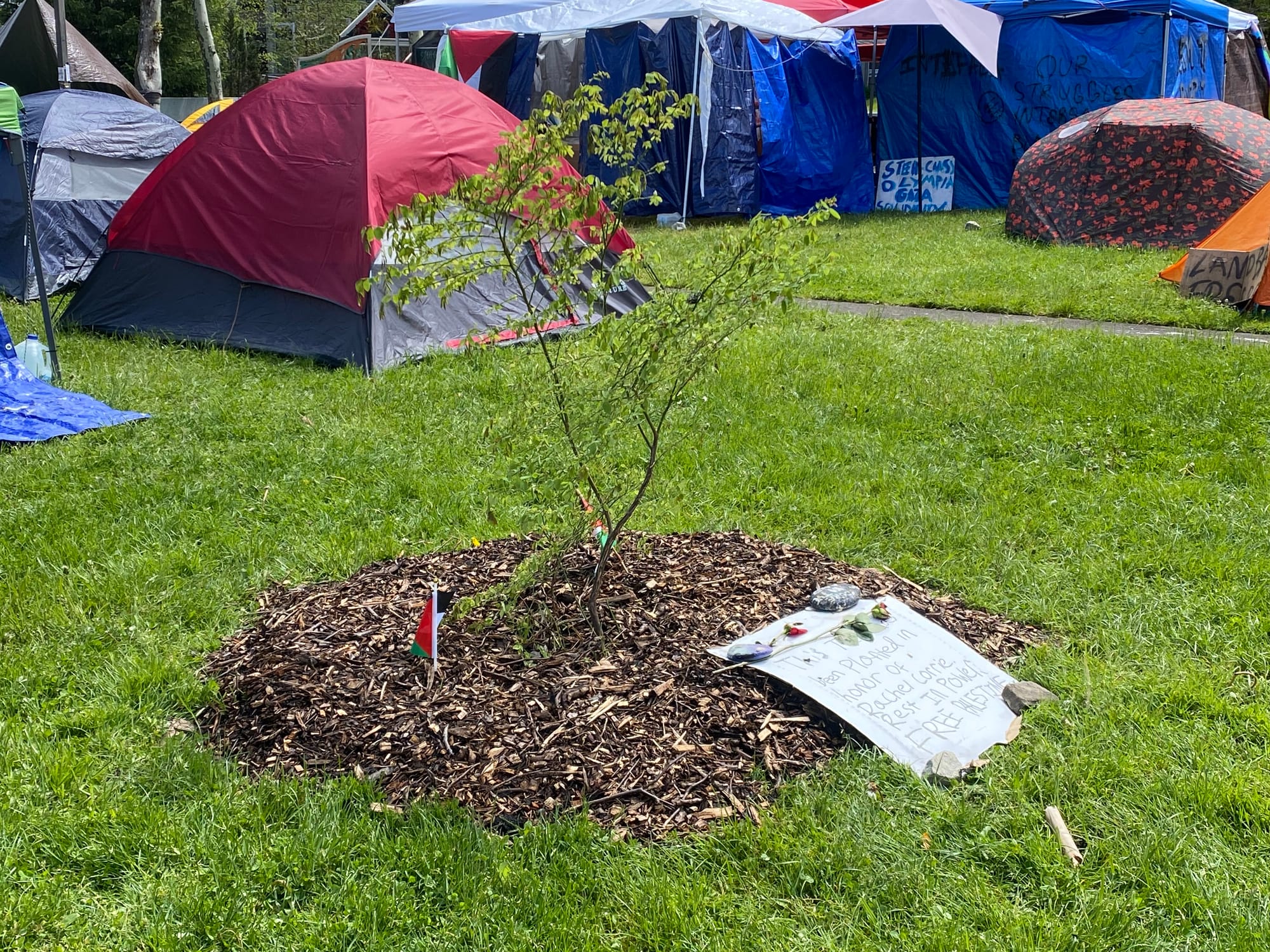Evergreen students achieve “historic” non-binding agreement on divestment

As UW Seattle students were setting up their “liberated zone” encampment last week, students at another Washington state college were dismantling their own solidarity encampment.
On April 23, about 150 students at The Evergreen State College in Olympia walked out of classes to protest U.S. military support for the genocide of Palestinians in Gaza. But instead of going home they usually did after protests, some students decided to stay and pitch tents on the college’s Red Square. The nascent Gaza solidarity encampment quickly grew to more than 20 tents and dozens of participants. Students also planted a tree in memory of Rachel Corrie, the 23-year-old alum who was murdered by an Israeli occupation bulldozer while defending a Palestinian home from demolition in the southern Gaza Strip city of Rafah.
Evergreen’s encampment is part of a growing student uprising that has grown to hundreds of universities around the world. Intense repression from police and university administrators has only spurred further activism from students, faculty members and allies. Participants demand their institutions divest all assets related to corporations complicit in Israel’s war machine and sever partnerships with Israeli academia. The protests have only increased in urgency as Israeli forces begin invading Rafah, which has transformed into a displaced persons camp for about 1.5 million people.
The Associated Press reports that police have arrested more than 2,400 students at 46 campuses across the country amid the crackdown. However, unlike those high-profile scenes of police violence, the Evergreen encampment managed to remain peaceful and calm. Students successfully negotiated an exemption from the university’s anti-camping policies.
Throughout the week after they set up their camp, students and sympathetic faculty members were locked in negotiations with Evergreen administrators over their demands for divestment. After a marathon six-hour bargaining session, student organizers emerged triumphantly at 9:30 p.m. on April 30 with a three-page memorandum of understanding (MOU). As part of the agreement, students agreed to remove the Gaza solidarity encampment.

The document outlines a multi-step process toward divesting Evergreen from Israel, including: Establishing a new responsible investment policy for its $23 million endowment, refusing academic grants from organizations that discriminate against Palestinians, prohibiting class credit from exchange programs to Israel, the West Bank or Gaza, recommitting to civilian oversight of the university’s police force and introducing civilian crisis response.
These changes would be overseen by “disappearing task forces” of university students, faculty and staff. While they don’t outright grant all the demands of the protesters, they create a pathway to achieving them.
Liz Arias, a 4th year Evergreen undergraduate student who was involved in the negotiations, said that while the compromise was controversial among activists on campus, it also provided a way to channel their momentum in the long term.
“There are a lot of people concerned that these task forces will not be able to achieve their goals,” Arias said. “But our faculty and many students, many underclassmen, have said this has provided them with a guide — specifically with the implementation and completion deadlines that admin agreed to — to continue to put pressure in a variety of ways.”
Arias added that the MOU was the first time Evergreen administrators had agreed to even consider divesting Israel-associated assets.
“I would say it is a historic document,” Arias said. “This one is explicitly stating that admin will be instituting all of these programs, hiring folks to make sure that these student needs are being met. But they will be led by students and faculty, not the administration.”
The agreement was seen as a significant symbolic win for the student movement, with some advertising it as “the first university to fully divest from Israel.” It could also have significant repercussions for UW’s much larger $4.9 billion consolidated endowment, as both funds are managed by the UW Investment Company.
However, as the document is not legally binding, some activists have cautioned against declaring a full victory. On Instagram, the Palestinian Youth Movement wrote that the MOU was “not equivalent to full divestment.”
Evergreen’s agreement echoes the experience of student activists at a handful of other universities, including Brown, which committed to holding a vote on divestment in October, and Northwestern University, where admin agreed to increase student and faculty input on its endowment investment policies and uphold students’ rights to protest.
These agreements between students and administrators have left many activists in a tricky gray space: Should they celebrate the wins, regardless of how partial they are, or should they condemn them and keep fighting for full immediate divestment and risk winning no material concessions? There is an inherent contradiction between the radical stances of the student movement and the realities of divestment being a very incremental process. Asset management is the definition of “working within the system.”
The difficulties remind me of the experience of the 2019-2020 uprising in Chile that was documented by journalist Vincent Bevins in his book “If We Burn.” A grassroots protest movement sparked by increasing transit fares, widespread economic inequality and police brutality successfully stopped normal life in Santiago for months on end. Amid the impasse, student protester-turned-deputy Gabriel Boric negotiated with fellow congress members a pact to start a process to bury the Pinochet-era constitution and write a new one. Initially, the effort seemed successful, with nearly 80% of voters backing the effort in October 2020. A left-leaning constitutional convention was elected the following year and then Boric fended off a far-right candidate for the presidency, winning 55% of the vote.
Following Boric’s inauguration, the left’s prospects in Chile started declining amid a corporate-backed resurgence of the reactionary right. By the time a referendum on the new progressive plurinational constitution was held in September 2022, it lost by a large margin of 62% to 38%.
So why am I delving into this seemingly random recent history of Chile? Because all of the same dynamics are in play in other protest movements as well, like the pro-Palestine student uprising we are witnessing right now. At the time of November 15, 2019 pact, Boric was called a traitor and sellout to the movement. An autonomously organized protest movement that successfully brought Santiago’s streets to a halt was co-opted by a lawmaker thrust into a once-in-a-lifetime deal-making opportunity.
No one can know if the Chilean people are better or worse off due to Boric’s intervention. On the one hand, it successfully achieved certain gains, including a constitutional convention and election of the most progressive Chilean head of state since Allende. But ultimately, the constitutional revision process failed and today Pinochet’s constitution remains and Boric’s administration is besieged by a conservative majority in Chile’s congress and the vociferous criticism of an oligarchic media class that has never accepted his legitimacy.
Like in Chile, Evergreen students were presented with opportune conditions for concessions: An institution plagued with recent financial difficulties, a liberal reputation to uphold and a strong pro-Palestine consensus on campus. However, unlike in Chile, Evergreen students still have a chance to write their own history. Whether they can translate the MOU into tangible divestment will depend in part on the tenacity of students and faculty.
“The students are aware that this is still their struggle and they have to continue to fight and pressure the college to make these divestments,” Arias said.
@guy.oron BREAKING: Today on May 1 at 1:30PM, University of Washington students set up a “liberated zone” encampment to protest in solidarity with Palestine. The protest is part of a national student movement across more than 100 campuses I talked with Zho from the United Front to learn more about why the coalition is demanding UW divest from Boeing and other weapons corporations that are accused of aiding Israel’s war and genocide against Palestinians in Gaza. @Real Change #news #UW #Seattle #Palestine #students #protest #encampment #journalism
♬ original sound - guy.oron
P.S. Pick up a May 8 copy of Real Change to read the full story about the UW liberated zone encampment!

Member discussion